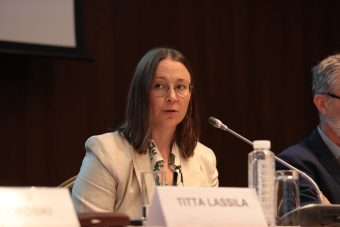The International Union for Conservation of Nature (IUCN), Regional Office for Eastern Europe and Central Asia (ECARO) today hosted the conference “ADAPT: Nature-based solutions for the climate in the Western Balkans”. The conference was dedicated to the extremely important role of Nature-Based Solutions (NBS) in improving the process of adapting to climate change and reducing the risk of disasters in the Western Balkans. The conference also successfully concluded the four-year initiative “ADAPT”: Nature-based solutions for more resilient societies in the Western Balkans, which aimed to promote and implement nature-based solutions to strengthen the resilience of ecosystems and communities to climate change and natural disasters in Serbia and the region .
The conference brought together representatives of state institutions from the countries of the Western Balkans, numerous experts in nature protection, as well as representatives of international and non-governmental organizations, practitioners and theorists in the field of climate.
“Today’s conference represents a key moment in the affirmation of nature-based solutions as a key strategy for responding to more adequately adapted to changed climate conditions in Serbia and the Western Balkans. The progress we have achieved through the “ADAPT” project in these four years, in cooperation with our key partners in the region, shows the transformative potential of nature-based solutions that offer comprehensive benefits for nature and humanity,” said Oliver Avramoski, director of IUCN ECARO.
“Integrating nature-based solutions into regional policies and their practical implementation on the ground is extremely important for affirming sustainable development, responding to challenges related to climate change and building a more resilient and sustainable future,” he added.
Nature-Based Solutions (NBS) they imply sustainable management, protection and restoration of natural ecosystems in order to solve social challenges, such as climate change and loss of biodiversity, and to reduce the risk of disasters. These solutions, which bring benefits to people and nature alike, including improving human well-being, improving biodiversity and increasing resilience to climate change, are increasingly being adopted and implemented around the world. Based on the Paris Agreement, over 130 countries have already incorporated Nature-Based Solutions — such as reforestation, urban green infrastructure development, sustainable agriculture and coastal zone protection — into their national climate change adaptation plans.
Nature-based solutions are of particular importance in the Western Balkans, given that Serbia and the region are facing increasing threats brought by climate change, such as extreme weather events, floods, droughts and loss of biodiversity. By applying nature-based solutions, the region can improve the process of adaptation to changed climate conditions, protect ecosystems and encourage a sustainable, green economy.

“We are very proud to support the “ADAPT” initiative, which significantly affirmed the role of nature-based solutions in strengthening resilience to climate change in the Western Balkans. Alignment with the implementation of the Green Agenda for the Western Balkans underlines our shared commitment to fostering sustainable development and effectively addressing these challenges,” said Titta Lassila, specialist at the Environment and Climate Program of the Swedish International Development and Cooperation Agency (Sida).
With the support of the Swedish Agency for International Development and Cooperation (Sida), the “ADAPT” initiative applied Nature-Based Solutions as a key tool to address climate change issues in the region. The project achieved exceptional results, from the creation of educational materials and guidelines for public policy to the implementation of initiatives focused on training and capacity building, which contribute to the empowerment of local communities, experts and decision-makers in the field of nature protection. Some of the main achievements of the “ADAPT” project include six studies on Nature-Based Solutions, which provide comprehensive insights into the application of RZP for climate change adaptation and disaster risk reduction in Serbia and other economies in the region. In addition, the publication “Nature-based solutions for the climate: A collection of best practices in the Western Balkans” highlights various examples of the application of RZP and their effects across the region. As part of the “ADAPT” project, over 120 participants from the region and 48 decision-makers received training on the topic of RZP and climate-smart planning, and it was also developed comparative analysis of public policies in the region in connection with the integration of RZP in the policies of adaptation to climate change and disaster risk reduction, which significantly improved knowledge, capacities and integration of climate change resistance policies at the regional level.
Two significant pilot projects dedicated to nature-based solutions were implemented in Kraljevo, Serbia, and Elbasan, Albania. These interventions on the ground are examples that show how RZP can be effectively applied in order to improve the resilience of local communities and reduce the risk of disasters, as well as to contribute to the mitigation of climate impacts. The pilot project for RZP in Serbia aims to restore 180 hectares of forest through natural regeneration, planting and bioengineering interventions, such as flood dams to mitigate soil erosion and protect against flash floods in the Gledić Mountains. Not only will these measures reduce the risk of disasters for local communities, but they will also provide socio-economic benefits through the installation of fences and the provision of a reliable source of water for livestock. In addition, the restoration of the composition, structure and function of forests will equally improve the ecological resilience and economic value of the landscape.
Conference participants also highlighted the importance of the Green Agenda for the Western Balkans, stressing that the successful implementation of the Green Agenda is crucial for ensuring long-term environmental sustainability and building resilient communities. The “ADAPT” project will continue to raise the level of implementation of Nature-Based Solutions in the second phase of the project, which begins in October, with new activities related to the implementation of RZP in the field, including the Zapadna Morava basin.
For more information about the ADAPT project and its outcomes, visit the IUCN ADAPT website.
You can watch a video dedicated to the pilot location Gledić, in Serbia here.
Source: energetskiportal.rs


